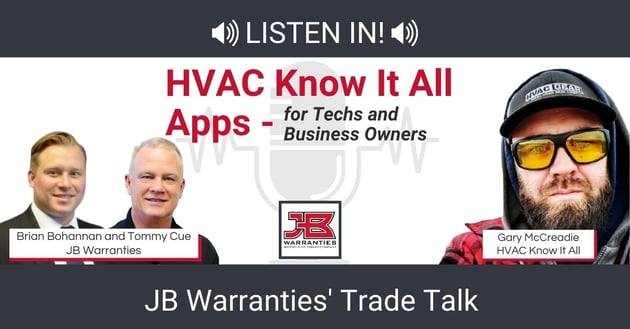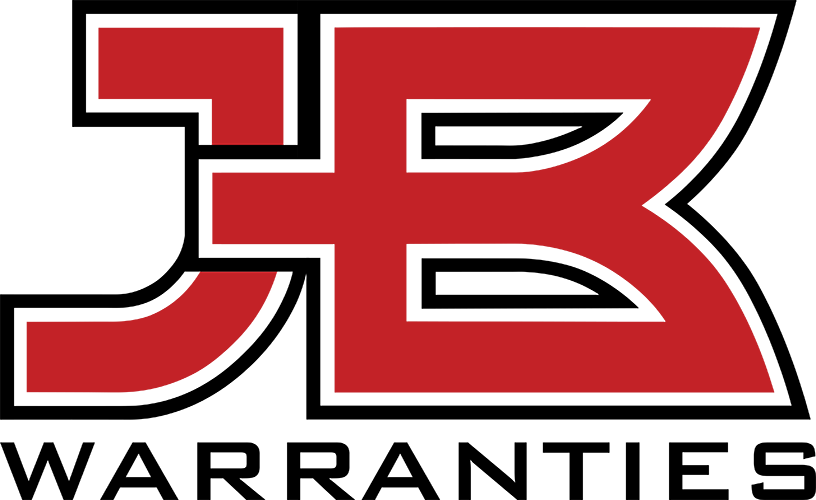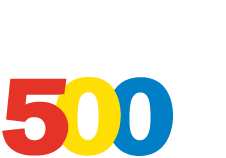
In this episode of Trade Talk, Brian Bohannan and Tommy Cue talk with Gary McCreadie from HVAC Know It All. Gary shares details about his new HVAC Know It All mobile app, his in the works Blue Collar Guru app, and a lot more about the HVAC tech life. Listen in and learn how his apps will help your HVAC techs and how it is also helpful for HVAC business owners.
Details about the HVAC Know It All App:
- For all experience levels
- A way to move away from social media with a dedicated platform for HVACR and plumbing for professional discussion, learning, and teaching.
- Manufacturers are allowed to take part, join any group and discuss any topic; however, they are only allowed to post in the Manufacturers Products and Training group.
Download the HVAC Know It All App:
Host: Brian Bohannan and Tommy Cue, JB Warranties
Guest: Gary McCreadie, HVAC Know It All
LISTEN
WATCH
READ:
Brian Bohannan: Good afternoon. Brian from JB Warranties, back with another episode of the Trade Talk podcast. Today, we've got a special guest. We've got the HVAC Know It All, Gary McCreadie in the studio. Gary, welcome. Thanks for being on the podcast today.
Gary McCreadie: Yeah, thank you for inviting me. But I want to clarify that I'm not a know-it-all, by the way, that's a very sarcastic name. So everybody doesn't think that, because I get a lot of questions from people, by the way. And the questions come in and I'm like, "I got no idea how to answer this." And I'm like, "Well, wait a minute, maybe because of the name HVAC Know It All, maybe they think that I know how to answer all these questions." But I really don't. It gets funny like that.
Brian Bohannan: No, I loved the title of the podcast when I saw it, I knew exactly how you were positioning it. So, I'm a big fan. We've also got Tommy Cue from JB Warranties, VP of sales, who actually is an HVAC know-it-all with us today.
Tommy Cue: Not hardly Gary, not hardly at all.
Brian Bohannan: Like I said, Gary, we've got a bunch of technicians, not everybody is a technician that we deal with. Most of our podcasts have been focused on business owners or the office; clerical, administrative staff, people that handle warranty work. But there's been a demand from our technicians out there, to get you on the podcast.
Brian Bohannan: So, you've got quite a following. Looks like you've got over 10,000 subscribers on your YouTube channel, that's pretty amazing in the air conditioning space. Can you tell us a little bit about kind of how you went from getting in the industry, to wanting to teach other people with this podcast?
Gary McCreadie: Yeah, and YouTube is actually one of the smaller platforms that I have. There's a lot of people out there that do similar stuff that have larger followings on YouTube. And YouTube is the thing that I kind of focus on least, because there's a lot of work that goes into YouTube videos.
Gary McCreadie: But for me, it just kind of started me as a technician, I would say, going back to when I was 18 coming out of high school. I went to a college that provided a course for refrigeration. So, I took that course, it was two years. I did little side jobs here and there, during the summer, for some residential companies. And when I was done schooling, I had some basic knowledge of the industry and stuff but no real hands-on knowledge of tools and stuff like that. So, that was the real learning curve for me.
Gary McCreadie: But I went out into applied to a handful of companies, a lot probably, within the local area that I lived and I got a call back from one of them. Went for the interview, and then had a second interview and then I got hired. And I'm still with that same company today, as a technician. So, I mean, that's 21 years, almost 22 years, now that I've been with the same company. So, it's been a good haul and I've learned a lot here.
Gary McCreadie: And I would say about five years ago, I got to the point where I was feeling sort of stale and I needed something else. And I didn't really want to go, I had a young family, I still got a young family, but I didn't really want to start a physical business in the trade because that would require me probably working a lot more. If I wasn't actually on jobs, I'd be trying to go out and promote myself or be quoting jobs and stuff like that, and I didn't really want to take that time away from my family.
Gary McCreadie: So, I've always had a real sort of love for the creative side; photography, videos, writing, so I figured I would try that out. So, I started off on Facebook and it was maybe 100 followers or so, in the first week. And all I would do is write about my call during the day and take a couple pictures and it just kind of escalated into different platforms, like Instagram and Facebook. I started a website and then a podcast, and now I'm on to an app. So, that's kind of the short story, if you will.
Gary McCreadie: Basically, I've been in the trade a long time, a lot of experiences with a lot of different things, and I thought I could share and help a lot of people along the way. And I wanted to do something for myself that was mine as well, but not actually go out and start a physical business in the trade.
Brian Bohannan: Man, I love your passion in your videos when you're up on the rooftop troubleshooting this stuff, and I can see why people are drawn to your content. Now, you mentioned the app, that's a pretty recent update, isn't it?
Gary McCreadie: Yeah. It gets kind of complicated with the app, because I'm actually working on one that I'm building from scratch and the app that I just launched about a week and a half ago is not built from scratch. There's a company called Disciple Media that actually helps you build these things and then you launch them with your own branding, your own coloring, and you create your own sort of discussion groups within. So, I had a lot of help from them doing that.
Gary McCreadie: But I'm also building one from scratch, that's been about a year-and-a-half in the making now, that hasn't launched yet. But hopefully, this year it'll be up and running. And we'll start slowly implementing it a little bit, I think.
Brian Bohannan: So Gary, is that app is that a training library or is that something where you target the app technicians looking for help and to learn or-
Gary McCreadie: Which one?
Brian Bohannan: Okay. So, which one would you recommend for our subscribers out there, if they're a technician, looking to have the access to a training library or just your catalog?
Gary McCreadie: So, I would say that the HVAC Know It All app that I just launched, it's a community. It's kind of like a mix. I like to say that I'm taking the best parts of Instagram, Facebook, and LinkedIn, and try to implement them into it as a community. Because LinkedIn has the professionalism, Instagram has a very good sort of, I would say, brotherhood of technicians that really help each other out, and then Facebook is more of a sort of a challenge network. Anytime you pop something on Facebook, you really get challenged in the comments section and I think that's important. I mean, the way some people go about the way they challenge is not right, because they're sort of rude and abrupt and can get offensive.
Gary McCreadie: If everybody pats you on the back and says, "Great job," you never learn. You need to be challenged. You need to be told that's not the right way, but you got to do it in a professional manner. So, I think the community that HVAC Know It All is, I want it to be a mix of all three of those things. And if you want to be part of the community, that's where you want to go.
Gary McCreadie: Now, the other app is called Blue Collar Guru. Now, that app is a little bit different because it's not a community, it's more of like, "I need help now, go target somebody else in the trade somewhere else in North America or the world for me."
Gary McCreadie: So basically, you set up a profile, you say what trade you're in and if you have a difficulty on a job, you create a video or a picture and a caption, and then you hit the dropdown box and you pick residential, commercial, whichever trade that you want the post to go to, and the app will target that specific trade. So, let's say there's commercial text, residential text, boiler text, chiller tax, but you're on a residential call and you only want residential technicians to get the notification, it will go only to them. Okay.
Gary McCreadie: So, it's not really a community because you're not following people, and you don't get notifications of people that you're friends with and people that you like pop up on your phone, it's more for like a help thing. And we're including plumbers, electricians, and HVAC technicians all within that app. So, that one, I think, is going to be a very slow process to build out, because I don't really have much of a community built with the plumbers and the electricians.
Gary McCreadie: HVAC Know It All app, we started with 1800 users within the first week and a half because I have that sort of base, I have the people that I know and stuff. And that community, it's supposed to be a crutch for each other and you can connect with people and message people back and forth within the app, Blue Collar Guru's a little bit different.
Tommy Cue: Nice. So, what are some of the more fun videos that you've made and troubleshooting, and sharing information with people around the world? What's unique about your platform?
Gary McCreadie: So, when I said earlier that YouTube is not really something I focus on a lot, is because a lot of work goes into YouTube. You got to film everything and you got to edit everything and then you have to apply all the sort of SEO tactics and stuff like that on the backend. So, a YouTube video that's 10 minutes long, could take you a couple of hours to really put together.
Gary McCreadie: So, I really enjoy the micro-content, and Instagram has sort of launched that with their one-minute videos. And I think, the one-minute videos you can get a lot of good information in one minute and you can also grab attention and keep attention within a minute. Where a YouTube video that's 10, 20 minutes long, you might see people drop it off after five, six minutes, because...
Gary McCreadie: Nowadays, I mean, it's sad but true, but the attention level of people is not what it used to be because we're used to this sort of micro-content newsfeed where it's just more, more, and more, I want more, and you just keep scrolling through it. So, that's why I really like the micro-content, because you hit the information real quick, real fast and people can learn from it real quick. And that's why I sort of focus on the Instagram and Facebook one-minute videos, more than I do on the YouTube side.
Tommy Cue: So, when people, and keep in mind I'm a little bit older so I don't keep up with all this social platform, how do they find you on these different platforms?
Gary McCreadie: Well, I mean, once you're on Instagram and Facebook, those platforms are very good at knowing what you like. You know what I mean? They have algorithms that know what people like, so they will actually show groups, or accounts, or whatever, to that person. If they know that person's interested in HVAC, they'll show them HVAC stuff and then it'll actually give recommendations of who to follow. So, a lot of it happens that way. And then it's also word of mouth too.
Brian Bohannan: Gary, I saw something, I was on your website earlier and there was a video and it talked about, what do you enjoy? And you like being in service because it's problem solving, it's that every day is different, you kind of get to connect the dots and try different things and it's problem solving.
Gary McCreadie: Yes.
Brian Bohannan: That is, I think, the hardest thing to learn, at least from what I've seen, is how to troubleshoot and how to work your way through different scenarios every day, where installs it can be a routine. The troubleshooting and the service tech stuff, there is such a shortage of training professionals that can do that. Your passion and training, I think, is good for people coming into the trade to be able to kind of speed up the learning curve.
Brian Bohannan: Out of curiosity, are you training people at the company that you're at now or is it just pure service and this is just for the greater good of other people, or are you actively involved in the training of the new technicians that come out of your company now?
Gary McCreadie: Yeah, I will take apprentices with me from time to time and when I do, I try to teach them as much as I can. And troubleshooting is one of those things that it is difficult, and it takes a lot of time and you blow a lot of stuff up when you're learning how to troubleshoot, you really do.
Gary McCreadie: And I tell people all the time, sometimes you got to step out of your comfort zone and you have to start playing with things, you have to, because it's all the mistakes that you make that make you a better troubleshooter. Because you make it once, you never do it again. And if you don't make that mistake, I mean, you're never going to learn. It's like a three-year-old child. I mean, if you walk it onto the road and it almost gets hit by a car, next time he hits that curb he's going to look before he... You know what I mean?
Gary McCreadie: That's sort of how you learn, you make the mistake and you learn from it and I've said through the years. There's a joke, a motor or a thermostat or a board, if you let the smoke out and you can't put it back in. I mean, once the smoke's out that's it, you can't put it back in and you learn from that mistake, hopefully. The best service technicians will learn from that mistake.
Tommy Cue: Is there any other advice you'd give to somebody that's coming in this industry? Is there another source other than yours that you found really valuable?
Gary McCreadie: Yeah, there's a lot of different sources out there and there's so many. There's guys like Brian Orr from HVAC School, who does a really good job. There's Jim Bergmann who developed MeasureQuick, which is a troubleshooting tool, for technicians that they can hook their wireless tools up to. That does a really good job with training.
Gary McCreadie: But for me, what I do is, if I don't know something, if I'm reading through... And this is why these conversations online are really good, because if you're reading something and you don't know that piece of equipment or you don't know that word or tool, right away, I will go onto Google and I will find out what it is right away, just so I have that knowledge.
Gary McCreadie: And I'm not afraid to ask people either, I'm like, "What is that?" I might sound stupid to them, but I'm not afraid of sounding stupid because I want to learn what it is. And that's one of the things I tell apprentices all the time. If you don't know ask, don't stand there with your hands in your pocket because you think you're going to get in trouble if you ask or because you think you're going to be looked down upon for not knowing, because if you don't know ask, because the next time you stand in front of it you will know what it is and you'll be better off for it.
Tommy Cue: Yeah. The one thing I noticed when I looked you up on your profile, you're a Combined Air mechanical now. Tell me just a little bit about them, are they residential, commercial, chilled water? What's Combined Air?
Gary McCreadie: Combined Air is the company that I work for and we are predominantly commercial, we don't do any residential. And we pretty much work on everything that's under the sun, except for the exception of large industrial chillers or centrifugal chillers. But we pretty much do everything; we do install, we do duct work, we do service, maintenance, everything.
Tommy Cue: Got you. Okay.
Brian Bohannan: So, Gary, before we wrap up I just got to ask is, one of the things one of the guys asked us to ask you is, do you have any good stories to tell us? So, you probably in 21 years come across some unique stuff, anything you could share with our subscribers?
Gary McCreadie: Well, I told a story the other day on social media about what happened to me in the fall, because I was looking at a set of Supco magnetic jumpers, like to jump out. If you wanted to test heating, you got to jump out R to W1, those are the terminals on the board that you would jump out.
Gary McCreadie: So, there was a rooftop and I jumped it out, I put my jumper on the alligator clip on R, which is power, and then on W1, which is the heating circuit. And I'm standing there watching it run and the alligator clip, I could see it sort of wiggling a little bit and it was all slow motion, and it came off and it swung down and it hit the high voltage; because the board is 24 volts and in Canada we work on a lot of 575 volts or 600 volts nominal, and it swung down and it hit the 600 volt fuse block. And that current went up and hit the low voltage board, and the board just started to smoke and it lit on fire.
Gary McCreadie: And it was already gone at that point. And I was so in awe of it, that I didn't run and shut the machine down, I actually watched it burn for a little while. I was trying to find my phone to take a picture or take a video but I'm like, "Maybe I shouldn't, because it might get worse while I'm looking for my phone." But I just watched it burn, because I was just so focused on the flame and how it was burning.
Gary McCreadie: I just thought I could learn something from it, the burn pattern or whatever. I just let it burn for a good 30, 40 seconds before I shut the machine down. And then maybe a few minutes later I turned it back on just to see what would happen and it went on fire again, and I'm like, "Okay. Well, we should probably leave this one alone and get this board replaced." That's a funny story from recent, that I just told.
Brian Bohannan: Okay. One more question, actually, you've been mentioning tools a little bit…passionate about the tools of the trade, I see that people are sending you stuff to kind of demo. Is it just that passion for tools, you walk into the supply house and see all the tools and it's like a candy store, or is it just [inaudible 00:18:00] they sent you something and you said, "Yeah, I can do a review online," or did you search that stuff out? Did you start asking people, "Now, let me demo your tools. I want to try them all."
Gary McCreadie: It's kind of both. So, when I first started this HVAC Know It All brand, I guess if you will, I was doing reviews of my own tools. And one person reached out to me and said, "You know what, I went out and bought three of those." And I'm like, "That's cool." And I'm like, "Are they helping you?" And he's like, "Yeah." He's like, "They're awesome. It's doing exactly what you said it would do in your video."
Gary McCreadie: So, then a light bulb went off and I said, "Well, what if I reached out to tool manufacturers and I started to receive tools from them and use them during my day and show people how to use them, and how they could benefit from them." And I did. And I started reaching out to a bunch. And obviously, you start cold calling people. You don't get responses from a lot, but some were like, "Okay, let's try this out." They send me something and then it would work out really well, and then we'd get into a professional sponsorship.
Gary McCreadie: So, now I work with a few different brands, I'd say up to about eight or nine now, that are on board with sponsoring the brand HVAC Know It All. They send the tools out, I show people how to use them. I demo the tools. People ask me, "Do you actually like the tools?" And I said, "Well, if you see them on my job site, I like those tools." I'm using them on my job.
Gary McCreadie: And something that I don't do is, I don't do a thumbs up or thumbs down review of a tool. What I do, and I think this is the most fair way to do it, is show people how to use the tool, show people the features of the tool. If they don't like those features, they don't need to purchase it. If they do like the features, then they can look into it further. So, all I'm doing is demoing the tool, showing the features.
Gary McCreadie: And if the job shows up on pictures and videos on my job sites, that means I'm in love with those tools and I really enjoy them. But I will look at anything really, because I like to learn. And when the smart probe thing first started happening, the wireless smart probes, I had a headache for a week trying to figure them out because I had a tablet that didn't have enough RAM on it and I couldn't connect more than three probes to my tablet. And I found out it's not the probes, it was the tablet, there was not enough RAM on the tablet to, enough power, to accept these probes. And I was scratching my head for a week.
Gary McCreadie: And when you finally find these things out, now it's just common knowledge to me, it's common sense to me. When someone goes out and buys a probe they say, "Make sure you got at least two gigs of RAM on that tablet or you might not be able to connect more than three." And these are the things that people kind of appreciate, because I've done the research, I've done my homework and I have the knowledge about them and I can help people out when they get into a jam like that.
Brian Bohannan: There are definitely a lot of passionate HVAC techs that are brand loyal to thier tool and it's like some of those guys are going back to the [inaudible 00:21:18] the torture test videos and stuff like that, it cracks me up. I want to say which brand I support, but then they might have a red brand logo.
Brian Bohannan: All right. We'll let you go. I appreciate you jumping on today. Hopefully, we can have you again soon. Everybody out there this is, again, Gary McCreadie the HVAC Know It All, give him a look on social media. It looks like a cross all platforms, over 100,000 subscribers. So, congratulations man, whatever you're doing it's working. Happy to have you on today.
Gary McCreadie: Well, I'm glad you guys asked me on, it was good talking to you. So, I appreciate it.
Tommy Cue: All right, Gary, thank you very much.
Gary McCreadie: Okay. Have a good one.
Brian Bohannan
Vice President of Sales at JB Warranties






